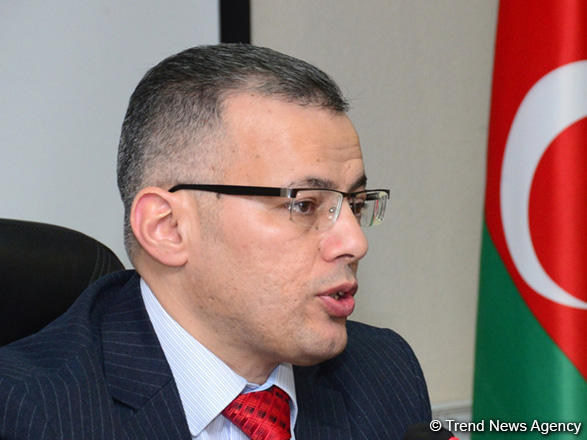BAKU, Azerbaijan, Nov. 6
By Eldar Janashvili - Trend:
Measures to establish cashless society in Azerbaijan are of comprehensive nature and are envisaged in the country’s strategic maps and other state programs and documents, Vusal Gasimli, executive director of Azerbaijan’s Center for Analysis of Economic Reforms and Communication, said at the IV International Banking Forum in Baku, Trend reports Nov. 6 from the event.
During the speech, Gasimli said that these measures cover a wide range of areas, such as applying compulsory health insurance, optimizing the tax system, creating necessary infrastructure and increasing financial literacy.
Measures taken in the direction of creating a cashless society include, in particular, reducing the tax burden on the salaries of private sector employees, reducing the simplified tax rate from four to two percent, exempting 75 percent of the income of small businesses from income (profit) tax in the order prescribed by law, exempting business entities from payment of dividends, stimulation of accounting in electronic form, the director noted.
These measures also include corresponding changes in the collection of taxes from individuals involved in the non-state sector and not carrying out activities in the oil and gas sector, as well as the preparation of draft laws “On payment services and payment systems”, Gasimli added.
“Direct and indirect economic consequences of digitalization are calculated in strategic roadmaps,” the director said. “In particular, the widespread adoption of digital payments will help significantly reduce shadow economy in Azerbaijan, keep records of payments, complete registration of value added in the economy and increase tax revenues. Doing this will lead to further increase in transparency in trade operations and calculations, in general in the financial system, thereby increasing real GDP in 2020 by 40 million manat ($23.4 million) directly, and by 15 million manat ($8.7 million) indirectly, and this will ensure growth by 55 million manat ($32.2 million).”
Digitalization of the mechanism for regulating economic processes will lead to increased efficiency in Azerbaijan’s financial and banking sector and an increase in real GDP by 120 million manat ($70.2 million) directly and about 15 million manat ($8.7 million) indirectly, which will result in growth by 135 million manat ($79 million), Gasimli noted.
“In general, as a result of economic reforms in Azerbaijan, transparency of turnover, decrease in the share of shadow economy, expansion of the tax base, increase in the access of the population and facilities to financial services, as well as increase in investment opportunities of the banking sectors are forecasted to be achieved,” the director said.
The two-day IV International Banking Forum, one of the most prestigious financial and banking events in the region, is taking place in Baku with the support of Azerbaijan’s Central Bank, the Financial Market Supervisory Authority (FIMSA) and the Center for Analysis of Economic Reforms and Communications.
The forum brings together heads of regulatory and control bodies in the financial and banking sector, leading managers of commercial banks and other participants of the financial sector.
($1= 1.7 manat on Nov. 6)






